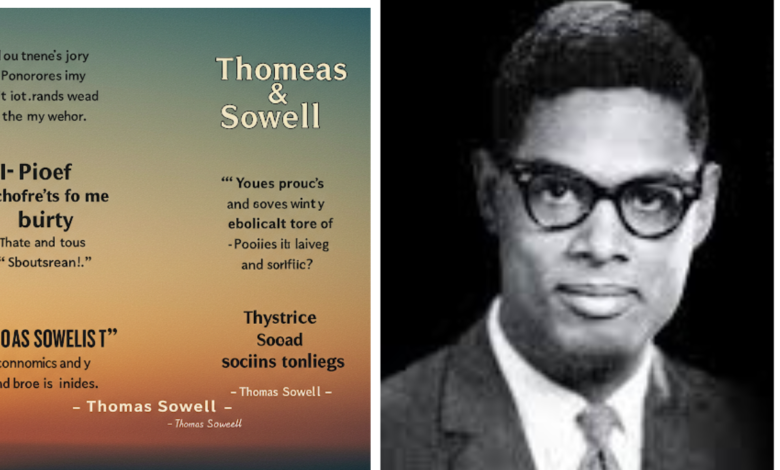Timeless Wisdom: The Most Impactful Thomas Sowell Quotes and Their Meanings

Introduction
Thomas Sowell is a renowned economist, author, and social theorist whose work has influenced discussions on economics, race, politics, thomas sowell quotes and education. His ability to distill complex issues into simple yet profound statements has made his quotes widely shared and referenced. Sowell’s insights challenge conventional wisdom and provoke critical thinking, making him a key figure in conservative and libertarian circles.
His quotes often touch on the dangers of big government, the failures of socialism, and the importance of personal responsibility. Whether discussing wealth disparities, political ideologies, or free markets, his words resonate because they are rooted in historical evidence and economic principles. This article explores some of Thomas Sowell’s most impactful quotes, their meanings, and their relevance in today’s world.
The Man Behind the Wisdom: Who is Thomas Sowell?
Thomas Sowell was born in 1930 in Gastonia, North Carolina, during the Great Depression. Raised in Harlem, New York, he faced economic hardships and racial challenges. Despite dropping out of high school, Sowell later joined the U.S. Marine Corps and pursued higher education at Harvard University, later earning a Ph.D. in economics from the University of Chicago.
Sowell has authored over 40 books covering topics such as economic policies, social justice, and political ideologies. His work is highly regarded for its logical analysis and rejection of emotional rhetoric. Throughout his career, he has emphasized the importance of facts over narratives, often critiquing policies that, while well-intended, have led to unintended negative consequences. His work continues to influence political discourse and economic thinking, making his quotes essential for understanding modern issues.
The Most Powerful Thomas Sowell Quotes and Their Meaning
On Economics and Free Markets
One of Sowell’s most famous quotes states:
“There are no solutions, only trade-offs.”
This quote encapsulates his economic philosophy—every policy decision has consequences, both good and bad. Many people advocate for policies without considering their unintended effects. For instance, while raising the minimum wage may seem like a solution to poverty, it can lead to higher unemployment as businesses cut jobs to afford increased labor costs.
Another powerful quote:
“The first lesson of economics is scarcity: there is never enough of anything to fully satisfy all those who want it.”
Sowell’s emphasis on scarcity is crucial in understanding why resources need to be allocated efficiently. Government interventions, such as price controls, often ignore this reality and create shortages or surpluses, harming consumers and businesses alike.
On Politics and Government
Sowell has been a vocal critic of government overreach. One of his most quoted statements is:
“The most basic question is not what is best, but who shall decide what is best.”
This highlights the dangers of centralized control. When governments make decisions for people, they remove individual autonomy and create inefficiencies. Policies designed to “help” often end up harming the very people they are meant to assist.
Another striking quote is:
“If you have always believed that everyone should play by the same rules and be judged by the same standards, that would have gotten you labeled a radical 50 years ago, a liberal 25 years ago, and a racist today.”
This speaks to the shifting nature of political discourse and how terms like “fairness” and “equality” have been redefined over time. Sowell warns against ideological movements that prioritize identity politics over merit and individual responsibility.
On Social Justice and Race
Sowell challenges many modern narratives about race and inequality. One of his notable quotes states:
“Racism is not dead, but it is on life support—kept alive by politicians, race hustlers, and people who get a sense of superiority by denouncing others as racists.”
This challenges the idea that systemic racism is the primary cause of disparities. Instead, Sowell argues that poor economic policies and lack of personal responsibility play a larger role in keeping communities disadvantaged.
Another quote worth analyzing is:
“The welfare state is not a solution to poverty, but a way of institutionalizing it.”
Sowell argues that government programs designed to alleviate poverty often create dependency, discouraging work and self-sufficiency. Instead of helping people escape poverty, they keep individuals trapped in a cycle of government assistance.
On Education and Intellectuals
Sowell has been critical of the modern education system and intellectual elitism. One of his most famous statements on the topic is:
“Too much of what is called ‘education’ is little more than an expensive isolation from reality.”
He critiques the rise of ideological indoctrination in universities, where students are taught to embrace certain political ideologies rather than critical thinking. Sowell warns that detachment from real-world consequences leads to flawed policymaking.
Another key quote:
“Intellect is not wisdom.”
Sowell makes a distinction between intelligence and wisdom, arguing that many highly educated individuals lack practical knowledge. He criticizes intellectuals who design social policies without considering their real-world effects, leading to disastrous consequences.
On Personal Responsibility and Success
One of Sowell’s most empowering quotes is:
“When you want to help people, you tell them the truth. When you want to help yourself, you tell them what they want to hear.”
He emphasizes the importance of honesty and personal responsibility. Rather than making excuses, individuals should take control of their lives, work hard, and make informed decisions.
Another powerful insight:
“The road to success is paved with mistakes well handled.”
Sowell encourages resilience and learning from failures. His philosophy aligns with the belief that individuals, not government programs, are the key to success and prosperity.
Why Thomas Sowell’s Quotes Matter Today
Sowell’s quotes remain relevant because they highlight timeless economic and political truths. His insights apply to modern debates on government policies, racial disparities, and education reform. His advocacy for free markets, limited government, and personal responsibility continues to resonate with those who believe in self-reliance over state dependency.
His work challenges mainstream narratives, encouraging people to question popular beliefs and seek evidence-based conclusions. Whether discussing socialism, inflation, or welfare programs, his insights remain a guiding force for those looking to understand economic and political realities.
Conclusion
Thomas Sowell’s wisdom stands the test of time. His quotes cut through emotional rhetoric and provide logical explanations for many of society’s challenges. His ability to simplify complex ideas into clear, thought-provoking statements makes his work invaluable.
Understanding his insights can help individuals think critically, make informed decisions, and navigate the modern world with clarity. His legacy reminds us that personal responsibility, economic freedom, and intellectual honesty are essential for progress.
FAQs
Who is Thomas Sowell, and what is he known for?
Thomas Sowell is an economist, author, and political commentator known for his work on free markets, race relations, and government policies.
What are some of Thomas Sowell’s most famous quotes?
Some of his well-known quotes include “There are no solutions, only trade-offs” and “The road to success is paved with mistakes well handled.”
How do Thomas Sowell’s economic views differ from mainstream economists?
Sowell advocates for free-market principles and limited government intervention, whereas many mainstream economists support more government regulation.
Why do some people disagree with Thomas Sowell’s views?
Critics argue that his views downplay systemic issues and promote conservative ideologies, while supporters praise his logic-based approach.
Where can I read more about Thomas Sowell’s work?
His books, including Basic Economics and Intellectuals and Society, are excellent resources for understanding his perspectives.
You May Also Read: https://fundaliy.co.uk/bryan-randall/



